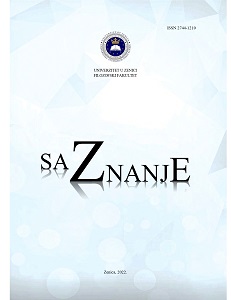FORMIRANJE I RAZVOJ SOCIO-KOMUNIKACIJSKIH KOMPETENCIJA STUDENATA PREDŠKOLSKOG ODGOJA I OBRAZOVANJA
FORMATION AND DEVELOPMENT OF SOCIO-COMMUNICATION COMPETENCES STUDENTS OF PRESCHOOL EDUCATION
Author(s): Naira Jusufović, Tamara Pribišev BeleslinSubject(s): Preschool education, Higher Education , State/Government and Education, Clinical psychology, Sociology of Education, Pedagogy
Published by: Filozofski fakultet, Univerzitet u Zenici
Keywords: socio-communication competencies; higher education study programs; nonviolent communication; pure communication; Choice Theory; micropedagogical environment;
Summary/Abstract: Socio-communication competencies, as one of the professional competencies of early childhood educators defined by the Agency for Preschool, Primary and Secondary Education (2011), should be formed and partially developed during university studies for early childhood education, and further developed through professional development of educators. Socio-communication competencies (Jusufović, 2021) based on Marshall Rosenberg's theory of a non-violent communication, Thomas Gordon's pure communication, and William Glasser's Choise Theory, all together play a key role in creating a supportive micropedagogical environment in the educational group, and thus optimizing conditions for growth and development of the child individually. In order to determine whether the study programs of early childhood education fulfill their tasks related to the formation and development of socio-communication competencies of future educators, a survey was conducted, which included 275 students from six study programs for preschool education at public universities in Bosnia and Herzegovina (Bihać, Bijeljina, East Sarajevo, Mostar, Sarajevo, Zenica). For the purposes of this research, the Scale for self-assessment of socio-communicative competencies was used (Jusufović, 2021). The results show that almost half of the students assess their socio-communication competencies below the basic level of development, regardless of the year of study. Since the results indicate that their behavior is in line with the theory of control and violent communication, which results in the creation of a blocking micropedagogical classroom environment, the question arises: Are the study programs of preschool education in line with modern scientific trends and why do they not contribute to the formation and development of socio-communication competencies of pre-service students?
Journal: saZnanje
- Issue Year: 3/2022
- Issue No: 3
- Page Range: 555-564
- Page Count: 10
- Language: Bosnian

